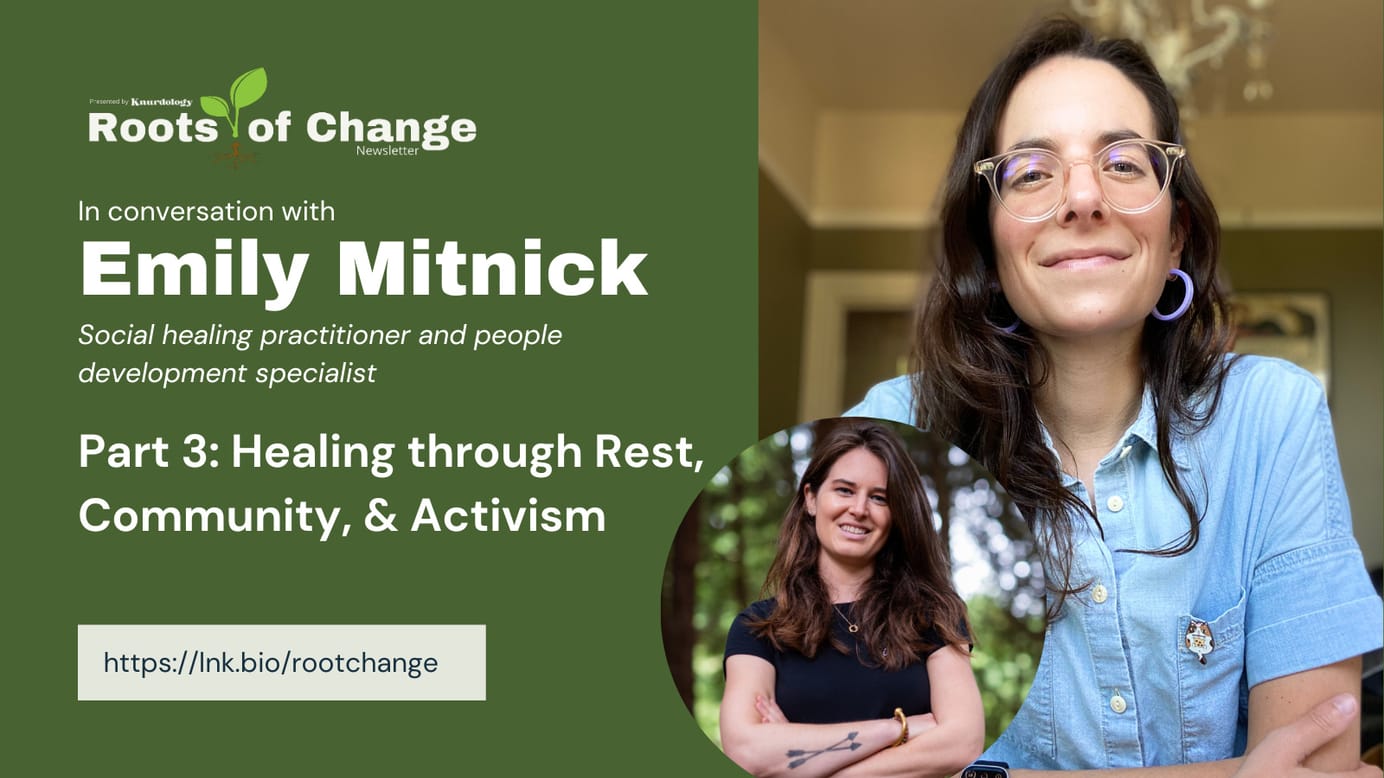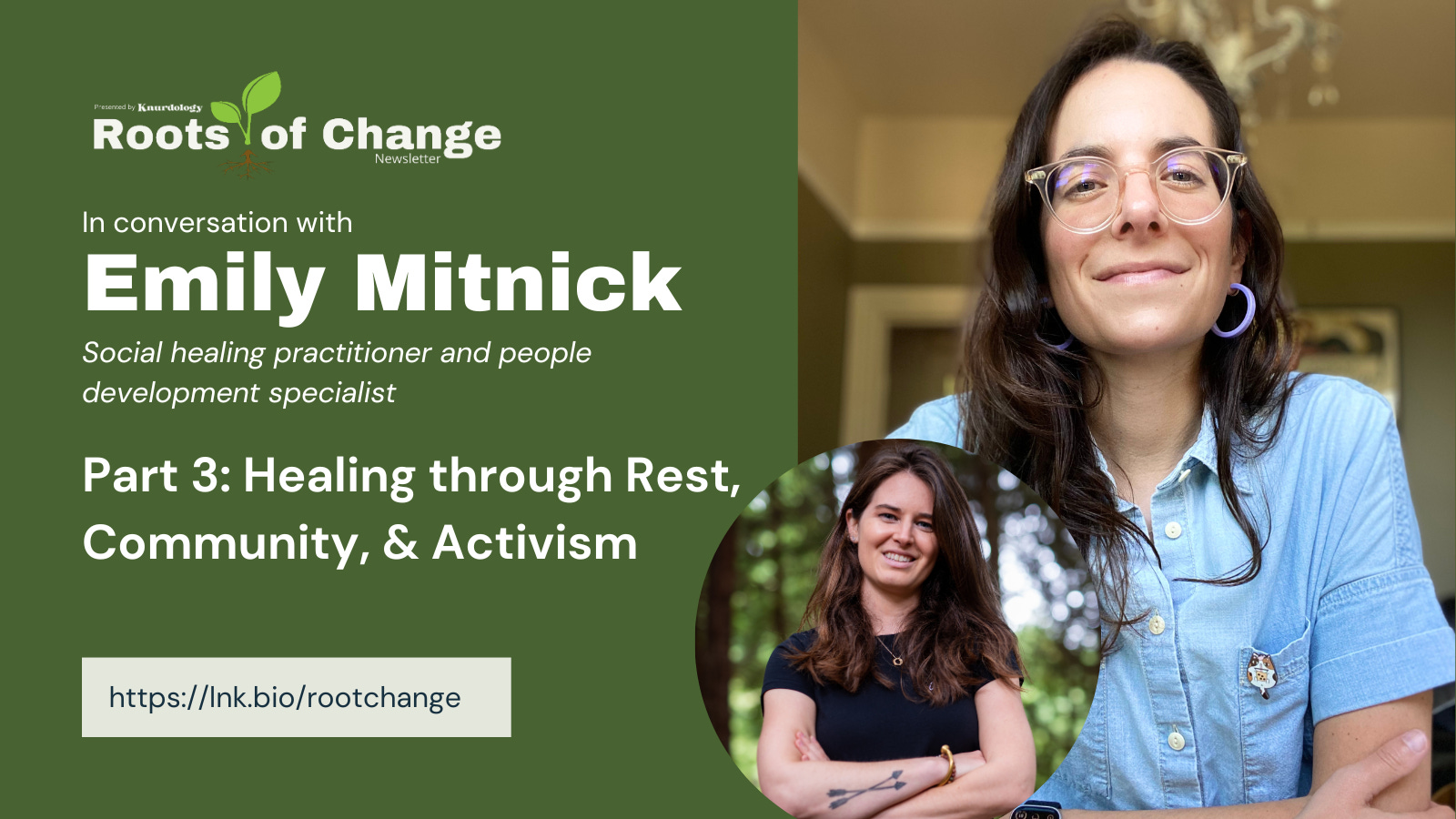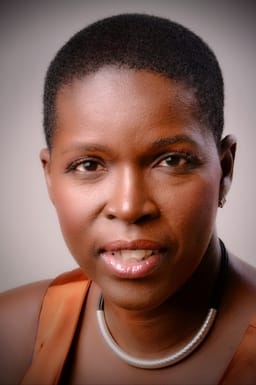
🎙 Healing through Rest, Community, & Activism
Part III: Exploring Somatic, Social, and Relational Healing in Relation to Activism
🤓 Bite-Sized Knurd: This week somatic healing practitioner, Emily Mitnick, and I bridge somatic healing with reality and use some clear-cut examples of how coming back into body as a collective can help us heal our society.
In Case You Missed It: Exploring Somatic, Social, and Relational Healing
📖 Read Today’s Interview👩🏻🏫

Sam Chavez (she/her) at Roots of Change
So I guess like going back to the yes and the no in the body, like how do we begin to find ourselves back in our body and start to see the yes and the no, like in this world where we're not being asked, we're not trained to do that and when it's frankly shamed to do that.
Emily Mitnick (she/her)
So this brings us back to what I proposed for practice this week, something for y'all to consider and to chew on, as we like to say. And what I had proposed was slowing down. And that is the very, very first requirement for noticing. If we are moving really, really quickly, we end up operating reactively rather than proactively. And so slowing down, which can also be a really big challenge for us, is step number one.
Sam Chavez (she/her) at Roots of Change
Can I pause there and just, you know, we haven't explicitly said this, but we talked about how society encourages us not to slow down, but, you know, in a white supremacist society, we are encouraged to react quickly.
Urgency is really key because it doesn't allow us to process. It gives us that like immediacy, that like animal instinct brain response that actually isn't tapping into our truest selves.
Emily Mitnick (she/her)
Yeah, I'm feeling called to name my privilege right now because rest is our birthright, but in our society, it is made to be a privilege. So I want to name that the dream of slowing down is that we have days on end of rest. We can choose when we rest, and I want to acknowledge that that's not a possibility for most people in the world.
What I am suggesting here when I talk about slowing down. I believe that we can do that in micro ways. We don't needed end to have days or hours on end. Slowing down is a mindset that we can step into where, Sam, like you said, we can release a sense of urgency, even if it's for even if it's for a moment. And a lot, can be done in a moment. It's a really powerful thing to be able to recognize, I'm going to choose this in this moment, and it might be brief, but I have this moment, and this moment is mine, belongs to me.
Sam Chavez (she/her) at Roots of Change
Yeah, I really appreciate saying that and just acknowledging the privilege of time and money and skin color and other privileges and just the idea that our everyday life. In these micro-moments, I think is so crucial. We talk about activism and in ways like activism, the way that people define activism as like, I can go to protests, I get to go to these organizing events, that is a privilege because that is the privilege of having the time or the monetary support, or you're a nonprofit worker who's really not getting paid enough and you're losing time from that.
And so, I think it's just important for us to recognize how much our activism can be in our everyday micro-movements and not as this rah-rah, gonna have my pink hat on 2020 caricature of what an activist should be. I'm not sure if you have anything else to add there.
Emily Mitnick (she/her)
No, I think you captured it. There's a role for for everyone in the revolution.
Sam Chavez (she/her) at Roots of Change
Yeah, I'm going to your role. I guess like, yeah, going back into like the continuing on to the next stage of like, you're, you're slowing down and then you start to notice things and talk to us about what that stage is and how that, how you should kind of approach that.
Emily Mitnick (she/her)
Yeah. I don't want to bring in any shoulds because there are so many ways to do this and I am proposing a single way to do it. In this moment. And so I invite, I invite anybody who is interested in noticing that the word for noticing is paying attention, being mindful, observing, to do it in a way that calls to you.
There's the slowing down, like we talked about, and then there is this intentionality, and that's a huge, huge piece. We're not just noticing because something is in our face or right in front of us.
We are noticing because we are intending to notice. When we slow down, there's a remembering to notice that needs to happen. I often invite folks to use post-it notes, calendar reminders, phone alarms, bracelets, whatever, so that when you see this thing, it catalyzes the intentionality of the practice of noticing. So there's a word, practice. Noticing and paying attention is a practice. It's something that we have to do again and again and again and come back to. It's a muscle and we have to exercise the muscles to keep it, right?
Just like we would if we go to the gym and lift or going on runs. If we stop doing that, the muscles atrophy and it doesn't mean the practice isn't going to be there waiting for us, but it does mean that we're going to have to continue putting in the work. It’s a lifetime commitment.
So we set our intention to practice noticing. And I believe what I proposed last week was paying attention to what was happening in the body. I think though, paying attention to what's happening in the body comes more easily to some than it does for others, depending on a whole variety of factors.
One of which might be how we, what kind of relationship we have with our body, whether it has historically felt safe to pay attention to what's happening in our body or not. So depending on who you are and how it feels, we can pay attention to different zones. And I love to share with folks the zones of awareness, which comes from the Gestalt therapy tradition, which is a mindfulness-based therapy. So we have our inner zone, which is comprised of our physical sensation. So that's feelings in the body, like physical sensations in the body, tingling, gurgling, numbness.
We can notice like where we feel energy in the body, like you were like, I'm feeling settled. And then also in our inner zone is our emotional body. So how we are feeling emotional. Sad, happy, regretful, frustrated, blissful, peaceful, you know. Yeah. Great. So paying attention there and the middle, the inner zone can be a challenging zone. Yeah.
So we also have, luckily, the middle zone, which is the home of our mental processes and thoughts. And we can observe them without getting on the narrative train and telling stories.
Sam Chavez (she/her) at Roots of Change
Right, do you want to expand on that a little bit?
Emily Mitnick (she/her)
Yeah. So what I often ask people to notice is the quantity and quality of their thoughts. Are there, if we think of our thoughts like clouds,
- Are they passing through quickly, slowly?
- Are they packed and dense?
- Are they sparse?
- Are they storm clouds and thundery
- Or are they like breezy spring clouds?
Emily Mitnick (she/her)
So yeah, we're thinking about quantity, quality. Is our mind racing? Is it slow and calm? These are the kinds of things that we are paying attention to in our middle zone.
And then finally, we have our outer zone, which is everything that we perceive through our senses. Taste in our mouth at the moment, whatever our fingers are touching or like for example, can we feel our clothing on our skin. What do we hear, what do we see if our eyes are open.
The full exercise builds the capacity to toggle among these three zones. However, when we're just getting started, we can start with one to two minutes a day going to one zone. Going to one zone.
Sam Chavez (she/her) at Roots of Change
Yeah, I mean, what's interesting, just in my own experience of coming back into body, feeling like before then I had a hard time, I wouldn't be able to differentiate between those three zones. Like feeling would be feeling and like the idea of even noticing how clothes sit on my body would not have been something that I would have even considered or thought about.
So it's that's interesting to think about like okay, how do we like you begin to unpack and untether. These pieces.
Emily Mitnick (she/her)
Yeah. Awareness is, in this tradition, made up of multiple parts. Yeah, which also highlights the complexity of awareness.
So we build awareness, not simply for the sake of building awareness, but because ultimately our goal is to develop agency. And when we look at agency, a huge component of agency, if not the whole concept of agency is about having choice and power over choice. That's what agency is, right?
And so in developing awareness, what ends up happening is we notice, I'm going back to somatics now, and if you weren't listening to our last conversation, somatic simply means of the body.
So when we're doing body-oriented work, when we are developing somatic, body-oriented awareness, Again, we're doing that because our body holds a treasure trove of information because it's our first source of language. And ultimately when we notice sensations in the body and we begin to pay attention and we come back again and again and again to paying attention, we all start to notice then, oh, I'm having this sensation and I'm having this emotional experience. Might the two be connected?
Yeah. And we can ultimately connect these dots and better understand “Oh, what is happening for me out here?” Right? What is the, what is the stimulus that is happening out here? That is triggering this body response that is then triggering this emotional feeling that is then triggering this thought that is then triggering this action.
Wow. If we have awareness about around those things, we can have choice. So we, and this is why the slowing down piece is essential because this all happens in a split second.
Sam Chavez (she/her) at Roots of Change
Yeah. Not to bring it like crashing into reality, but I, I like I'm looking at My Grandmother's Hands and we talked about this on the last podcast. I can't help but just think about that book because it talks about the body and what generations of trauma has done to the body.
And they specifically talk about police officers and how the trauma and the way that our system works is so traumatic for the officer, not to mention the black and brown people that are being impacted by the traumas of policing in America.
That person's body is just completely wrecked and they are they don't know how, because they're reacting in the moment, because they haven't done that body work. And police and our society, again, does not ask us to do that.
And I think, you know, we talked about violence last week. I think that is violence, obviously, to the people that policing impacts, but it's violence to the policemen and women that are in, Officers. Officers, thank you. The police officers. And that is just devastating to know that.
Every circle, everyone in that incident is being impacted by the traumas of our body because we've been disconnected from our bodies. And so that is like the most real world example that you can think of is why do these officers, why are they reacting that way in that high of numbers towards black and brown bodies?
And I think we can understand that as we understand how white supremacy has disconnected us and told us that reacting with violence in that moment is what we need. And that is the soapbox that I am on right now.
Emily Mitnick (she/her)
I think that was a great example, a great crash into reality. And I think we need those crashes into reality because this work can feel abstract until it doesn't. That abstraction is actually harmful.
Yes, there is harm in the abstraction of these somatic practices. And if we don't know how to bring them down to earth, if we can only talk about them, they're no good to us. That's sort of the whole problem we're seeking to address in the first place.
Sam Chavez (she/her) at Roots of Change
Well, and I would just say that that is by design. I speak a lot about the United States, but this is like also global, but specifically our healthcare system is horrible in the United States and that was a project by the Republican Party and conservative people to dismantle mental health services.
And so when we don't have the resources and we don't have systemic support, it makes it harder for us to find the resources that we need. I know that there are amazing people out there that are sharing those resources and it's growing in a movement. And I'm really heartened to see that. But I think that's something that people should be aware of so that they don't feel like this is falling on them, that they are failing because, you know, doing the work is a sign that you are not failing.
It's a sign that you are wanting to grow, and it's okay if you don't have the resources because our society is not designed to have those resources.
Emily Mitnick (she/her)
And that still doesn't mean that you can't do the work, because the work isn't something that happens only within a therapist's office, and that is, we'll talk about that in future conversations, but this work is available to all of us, if we are aware of it, if we talk to our friends and our family about it, it is here. It requires having attention and being intentional about where we focus our attention.
Sam Chavez (she/her) at Roots of Change
Yeah. Yeah, I think that's a really awesome place to land. I'm curious if you want to bring anything else into the space. As we kind of start to wrap up the conversation.
Emily Mitnick (she/her)
I think this is a great place to land and in terms of things to carry with you into the week, I have a beautiful book recommendation, “The Wisdom of Your Body” by Hilary McBride. I found that to be a really well-researched book that felt accessible. And it wasn't in academic, super heady academic language. I felt like she did an excellent job of bringing concepts down to earth.
So I would recommend that book and I would also invite what I did last week, which was finding a moment or two to slow down and to pick one of the zones to pay attention to, set a timer for 60 seconds to 10 minutes, depending on what you have available to you and pay attention and see what you notice. And if you find yourself drifting, that's also completely normal and okay, and just Invite yourself back, the practice is always there waiting. It's a faithful friend. Thanks, Sam.
Sam Chavez (she/her) at Roots of Change
I love that. Yeah, thanks so much. And we will be back. I know, I think Thanksgiving is next week. So we'll probably take a week off. But we'll be back again just to talk about this and talk about repair and talk about community more. So yes, and for anybody who watches the video, maybe we will get a better camera that doesn't make us glow in the worst way possible. Yes, Casper the Friendly Ghost has made it into November. All right. Thanks, everyone.
About Emily Mitnick (she/her)
Hey – I'm Emily. My greatest joy comes from creating and fostering relationships that offer space for people to feel seen, heard, and nourished so that they can bring their greatest gifts to the world from an empowered, embodied place.
For the past 13+ years of my professional life, I’ve followed my curiosity to explore how humans relate to the built, natural, and social environment, navigate relationships within organizations and with work, repair and transform through intrapersonal and interpersonal conflict, and heal the connection between mind and body.
I'm deeply excited about designing and facilitating people-first, integrative experiences that are supportive, inclusive, generative, and sustainable. Doing this work with people who are committed to creating a more equitable, compassionate, and creative world excites me even more.
When I'm not at my desk, you might find me riding my bicycle up steep hills, writing poetry and telling stories about queerness and mental health, playing the guitar, gobbling up books, and running mountain trails.
the roots of change media Newsletter
Join the newsletter to receive the latest updates in your inbox.



